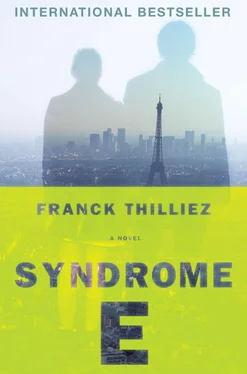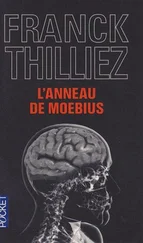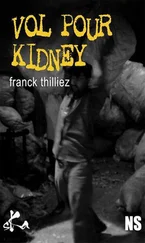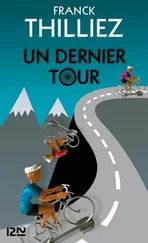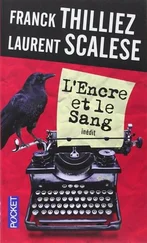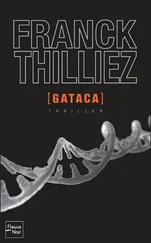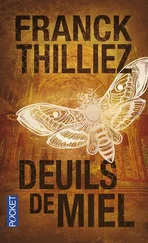He snapped some branches, threw in a log, and lit it with a match. He watched the fire catch for a few moments. Lucie felt abnormally cold and rubbed her forearms.
“In 1977, I was barely twenty-five. The law office of Joseph Rauth, Washington, D.C. Two men, a father and son, arrived in Joseph’s office. The son, David Lavoix, was holding an article from the New York Times , and the father seemed… troubled, absent. David Lavoix held out the clipping, which talked about Project MK-Ultra. Just so you know, the Times had sent the first shot across the bow two years earlier, in 1975, by revealing that in the fifties and sixties the CIA had conducted mind-control experiments on American citizens, mostly without their knowledge or consent. Investigative hearings were held and the American people were officially informed about the existence of this top secret project.”
He nodded toward a large library.
“It’s all in there. Thousands and thousands of pages in the archives, available to any citizen. The whole thing has long been a matter of public record—there’s nothing secret about what I’m telling you.”
Philip Rotenberg went to leaf through his documents. He quickly pulled out a copy of the New York Times from back then and handed it to Lucie.
Lucie opened the newspaper. A very long piece took up much of the front page. Certain words were underlined in ink: Dr. D. Ewen Sanders… Society for the Investigation of Human Ecology… MK-Ultra Project …
“That day, Joseph Rauth asked the humble Mr. Lavoix how his office could be of assistance. And young Mr. Lavoix answered, casual as you please, that he wanted to sue the CIA. The CIA! ‘Why?’ asked Joseph. Mr. Lavoix pointed to his father and said plainly, ‘For the mental destruction and brainwashing of a hundred adult patients in the 1950s at Allan Memorial Institute, McGill University, Montreal.’”
Behind him, the fire was spreading through the logs and the kindling crackled noisily. In the middle of nowhere, in the heart of this wild, unknown province of Quebec, Lucie felt uneasy. She finally picked up her beer and uncapped it. She absolutely had to loosen the knot in her stomach.
“Montreal, once again,” she said.
“Yes, Montreal. Still, the Times article didn’t mention Montreal, or Canada. It simply said that in the fifties the CIA had established a number of covert organizations to develop its research into brainwashing, such as SIHE, the Society for the Investigation of Human Ecology. Nothing very remarkable in that, just one more revelation about Project MK-Ultra, as we’d been used to seeing in the Times for months by then. But look here, this underlined name…”
“Dr. D. Ewen Sanders. Head of research at SIHE.”
“Ewen Sanders, that’s right. Now, according to Mr. Lavoix, a certain Ewen Sanders had been, some years earlier, the chief psychiatrist and director of the Allan Memorial Institute. The place where David Lavoix’s father, the rather passive individual there before us in the office, had gone to treat a case of simple depression and from where, long years later, he emerged with his mind entirely shot. For the rest of my life I will remember the sentence he managed to utter that day: ‘Sanders killed us inside.’”
Sanders killed us inside. Lucie set the paper down on the table. She thought of what the archivist had given her to understand: experiments on human beings, conducted by Canadian psychiatric institutions.
“So this Project MK-Ultra had covert branches in Canada?”
“Precisely. Despite the 1975 hearings, no one knew that the American invasion of the mind had reached Canada. With his Times article, and by sheer chance, David Lavoix had touched on a major element that incriminated the CIA still further, and to the highest degree.”
“So did you do it? Did you sue the CIA?”
With a gesture, Rotenberg invited Lucie to join him at his computer, on a desk near the library. He clicked through several password screens and then skimmed through his computer files. One bore the name “Szpilman’s Discoveries.” He clicked on another folder, titled “McGill Brainwashing,” and moused onto a PowerPoint file. Underneath it was an AVI video file called “Brainwash01.avi.”
“Nine of Sanders’s patients, with their families’ support, brought suit following Lavoix’s example. The other McGill patients were either dead, too traumatized, or incapable of remembering the treatments they’d been subjected to. Now listen carefully to what I’m going to tell you—it’s essential for what follows. In 1973, the CIA, informed that reporters were sniffing around their affairs, had destroyed all the files concerning Project MK-Ultra. But the CIA is, above all, an enormous bureaucracy. Joseph Rauth was convinced that some traces had to remain of such an important project, which had extended over twenty-five years and involved dozens of directors and a staff of thousands. Under the auspices of the Rockefeller Commission, we were authorized access to documents or other materials relating to research into mind control. We hired an ex-CIA operative named Frank Macley to look into it. After several weeks of investigation, he confirmed that most of the files had been destroyed by two high-ranking officials: CIA Director Samuel Neels and one of his close associates, Michael Brown. But through his persistence, Macley unearthed seven huge crates of documents relating to MK-Ultra at the Agency’s records storage facility. Crates that had gotten lost in the administrative labyrinth. More than sixteen thousand pages on which the names had been redacted, but that related in detail how some ten million dollars had been spent for MK-Ultra via a hundred and forty-four universities in the United States and Canada, twelve hospitals, fifteen private companies—including Sanders’s—and three corrections facilities.”
He clicked on the PowerPoint file.
“From those archives, we recovered photos and a film, which I digitized and put in this folder. Here are some of the photos, taken by Sanders himself during his experiments, presumably at McGill.”
Images scrolled by. There were patients in pajamas, strapped onto gurneys, lined up behind one another in endless corridors; then the same patients with earphones padlocked to their heads, sitting at tables in front of enormous tape recorders. Their faces were numb, passive; black rings sagged beneath their haggard eyes. Lucie had no trouble imagining the atmosphere of terror that must have reigned over the psychiatric hospital at McGill.
“Here are Sanders’s tragic victims. He was a very brilliant psychiatrist whose great ambition was to cure mental illness, without ever managing to. It drove him crazy. One day he realized, completely by chance, that the intensive repetition of a tape that forced patients to listen to their own therapy sessions seemed to have a beneficial effect on their state of mind. But from there, it would escalate into horror. At first, Sanders forced his patients to put on headphones for three or four hours at a stretch, seven days a week. When they started to get exasperated and rebel, he created lockable headsets that couldn’t be removed. So then the patients broke the tape recorders, and in response he put the machines behind cages. The patients ripped out the wires, so they were put in restraints. Sanders ended up giving them LSD, a devastating new drug that hadn’t existed a few years earlier. For the psychiatrist, LSD was a miracle: not only did the patients remain tractable, but their conscious minds no longer blocked the way—so that words transmitted over and over through headphones would lodge directly in their brains.”
LSD… Judith Sagnol… the presence of a doctor in the old warehouse… Could it have been Sanders? Had the doctor known Lacombe? Had the two men worked together on MK-Ultra? The questions piled up. And Lucie knew Rotenberg would have the answers.
Читать дальше
